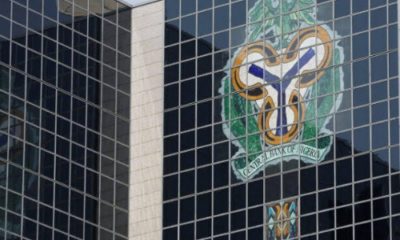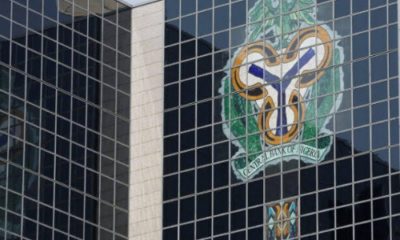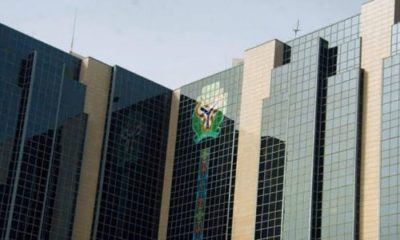Finance
CBN Announces Sale Of Polaris Bank, Unveils New Owner
By Funmilayo Olusanya
The Central Bank of Nigeria (CBN) has revealed that the sale of Polaris Bank has been completed.
This was revealed in a statement on Thursday, by the Director of Corporate Communications at CBN, Osita Nwanisobi.
Strategic Capital Investment Limited is the bank’s new primary investor, according to Nwanisobi, who also revealed that the CBN and Asset Management Company of Nigeria signed the transaction with SCIL (AMCON).
In his words: “Polaris has been operating as a bridge bank since 2018 when the Central Bank of Nigeria intervened to revoke the licence of the former Skye Bank Plc and established Polaris Bank to assume its assets and certain liabilities.
“As part of the CBN intervention, consideration bonds with a face value of N898 billion (future value of N1.305 trillion) was injected into the bridge bank through AMCON, to be repaid over a 25-year period. These actions were taken to prevent the imminent collapse of the bank, enable its stabilisation and recovery, protect depositors’ fund, prevent job losses and preserve systemic financial stability.
Read also>>>Rights Group Asks President Buhari Not To Allow Sale Of Polaris Bank
“SCIL has paid an upfront consideration of N50 billion to acquire 100% of the equity of Polaris Bank and has accepted the terms of the agreement which include the full repayment of the sum of N1.305 trillion, being the consideration bonds injected.
“The CBN thus received an immediate return for the value it has created in Polaris Bank during the stabilisation period, as well as ensuring that all funds originally provided to support the intervention are recovered.
“The sale was coordinated by a Divestment Committee comprising representatives of the CBN and AMCON, and advised by legal and financial consultants. The Committee conducted a sale process by ‘private treaty’, as provided in Section 34(5) of the AMCON Act to avoid negative speculations, retain value and preserve financial system stability.
“In the process, parties who had formally expressed an interest in acquiring Polaris Bank, subsequent to the CBN intervention in 2018, were invited to submit financial and technical proposals.
“Invitations to submit proposals were sent to 25 pre-qualified interested parties, out of which three (3) parties eventually submitted final purchase proposals following technical evaluation.
“All submissions were subject to a rigorous transaction process from which SCIL emerged as the preferred bidder having presented the most comprehensive technical/financial purchase proposal as well as the highest rated growth plans for Polaris Bank.”
Commenting on the transaction, the Governor of the CBN, Godwin Emefiele, said: “This sale marks the completion of a landmark intervention in a strategic institution in the Nigerian banking sector by the CBN and AMCON.
“We commend the outgoing board and management for their vital role since the bridge bank was established; in stabilising the Bank’s operations, its balance sheet and implementing strong governance structures to address the issues that led to the intervention.
“This process has provided the CBN with an unprecedented opportunity to recover its intervention funds in full and promote financial stability and inclusive growth.
“We wish SCIL well as they implement growth plans to build the bank from the strong foundations that have been established.”
Banking
CBN Denies Currency Devaluation

The Central Bank of Nigeria (CBN) has refuted claims of devaluing the.
Earlier reports suggested that the CBN had devalued the Naira, lowering its exchange rate from N631 to the dollar, compared to the previous day’s rate of N461.60 at the Importers and Exporters (I&E) window.
However, the Central Bank of Nigeria (CBN) released a statement on Thursday through its Acting Head of Corporate Communications, Dr. Isa Abdulmumin, categorizing the report as false information.
In the statement titled ‘CBN Has Not Devalued The Naira’, he said the attention of the apex bank was drawn to the news report by an Abuja based newspaper edition of June 1, 2023, titled “CB Devalues Naira To 630/51”.
However, the CBN stated categorically that the news report was replete with outright FALSEHOODS and destabilizing innuendos, ‘reflecting potentially willful ignorance of the said medium as to the workings of the Nigerian Foreign Exchange Market.’
“For the avoidance of doubt, the exchange rate at the Investors’ & Exporters (I&E) window traded this morning (June 1, 2023) at N465/USS1 and has been stable around this rate for a while.
“The public is hereby advised to ignore the news report by Daily Trust in its entirety, as it is speculative and calculated at causing panic in the market,” the CBN spokesman added.
He, therefore, advised media practitioners to verify their facts from the Central Bank of Nigeria before publishing in order not to misinform the public.
Banking
BREAKING: CBN Increases Interest Rate By 0.5%

The interest rate in Nigeria has been raised to 18.5 percent, up by 0.5 percent, from 18 percent where it was pegged in March 2023.
The Central Banks of Nigeria’s (CBN) Monetary Policy Committee (MPC) resolved to this effect at its third meeting of 2023 in Abuja, on Wednesday.
Governor, CBN, Godwin Emefiele, made the disclosure in the communiqué of the MPC’s meeting, thereafter.
While engaging the media at the end of the two-day meeting, Emefiele, said the committee voted to keep the asymmetric corridor at +100 and -700 basis points around the MPR.
In the view of the MPC, rising inflation rate is traceable to the high energy cost and challenges around the supply chain, among others, which lie outside the corridors of the CBN.
Emefiele said, “The current trend in price development would continue to be monitored by the bank with greater collaboration with fiscal authority to address the drivers of inflation.”
Biztellers reports that the CBN had effected six consecutive interest rate increases, which has seen the rate move from 11.5 percent in March 2022 to 18.5 percent in May 2023.
Finance
Dangers Lurk As Nigerians Resort To Refurbished Gas Cylinders

In Nigeria, people have been forced to come up with creative solutions to cope with the effects of inflation and the economic crisis.
These improvised strategies have not only helped individuals save money, but also enabled them to stay afloat during difficult times.
In a concerning development, the recent trend of boycotting the high cost of cooking gas cylinders in Nigeria may pose a greater risk to lives than it does in terms of saving money.
Economy&Lifestyle investigations have revealed that the soaring prices of gas cylinders have reached a point where it has become increasingly challenging for average households to afford them, let alone refill them with gas.
The situation is further exacerbated by the fact that the pump price of kerosene, which would typically serve as an alternative, has become prohibitively expensive.
Upon investigation, it was found that the prices of gas cylinders vary depending on their sizes. A 3kg gas cylinder is priced at N14,000, while a 5kg cylinder costs N16,000. The larger cylinders are even more costly, with a 6kg cylinder priced at N17,000 and a 12.5kg cylinder costing N19,000.
Additionally, the expense continues when it comes to filling these cylinders with cooking gas, as it costs N2,600 for a 3kg cylinder, N5,200 for a 6kg cylinder, N8,950 for a 10.5kg cylinder, and N10,650 for a 12.5kg cylinder.
Consequently, an average household that needs to replace a worn-out 5kg cylinder would have to come up with N20,250 to purchase a new cylinder and fill it with gas, which can be a difficult feat to achieve.
As a result, many people have resorted to refurbishing their old cylinders and trying to use them as best as they can. However, this approach poses a significant danger.
Mrs. Rukayat Adesoji, a trader, shared her experience regarding her gas cylinder, which had become rusted and could no longer stand upright since last month. Due to the exorbitant prices of purchasing new cylinders, she resorted to seeking the assistance of a welder.
The welder patched the legs of the cylinder, repainted it, and ever since then, she has been using the refurbished cylinder for her cooking needs.
She said ““My gas cylinder which was 6kg got rusted and no longer stands erect since last month. When I asked for the price, I was told it was N17, 500. I was discussing it with a friend who advised me to take it to a welder to paint it and construct a new stand. I heeded to her advice and at the end spent just N3, 000 to turn my cooking gas to a brand new.”
Apart from refurbishing cylinders, some people don’t even know when their cylinders will expire. Mrs. Mercy Opara, a hair stylist, falls in that category as she explained: “I am taking my gas cylinder to the welder to spray it for me. It just cost N1, 500.
“The cost of buying a new cylinder is high. I have been using my cylinder for over 7 years and I don’t even know the expiry date. I just pray God blesses me so that I can buy a new one. But this one I am managing will look neat after spraying it for another two years.”
Mr. Adekanbi Joseph, a wielder, said he paints cylinder and “To paint and rebuild a cylinder stand, I charge N4, 500. Many people come here to paint as a new cylinder is now very expensive to get.”
Highlighting the potential dangers of using refurbished cylinders, Mr. Benjamin Hope, the Chief Executive Officer of FKT Cooking gas and general goods, emphasized the risks involved.
He stated that even a brand new cylinder can pose a risk of explosion if the locks are not properly secured after use or if the cylinder filled with gas is moved from one location to another.
He said “A brand new cylinder can explode if the locks are not well keyed after using and if the cylinder filled with gas was moved from one place.
“There are many reasons for the high cost of gas cylinders in Nigeria. One is the cost of importation due to the exchange rate. Another is the increased migration from the use of kerosene to cooking gas which has necessitated increased demand for gas cylinders. You know that in such a case there will be increased importation of cylinders.”he added



















